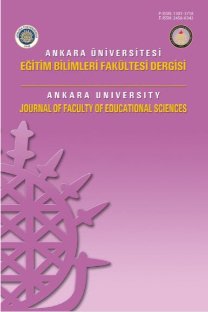Calculation method problems of KPSS P10
KPSS P10 hesaplama yöntemine ilişkin sorunlar
___
- Akyüz, Y. (2005). Türk Eğitim Tarihi. Ankara: Ankara Üniversitesi Eğitim Fakültesi Yayınları.
- Crocker, L., & Algina, J. (1986). Introduction to classical and modern test theory. San Diego, C.A: Harcourt Brace Jovanovich College Publisher.
- Kan, A. (2010). Test Eşitleme: Aynı Davranışları Ölçen, Farklı Madde Formlarına Sahip Testlerin Đstatistiksel Eşitliğinin Sınanması. Eğitimde ve Psikolojide Ölçme ve Değerlendirme Dergisi, 1(1), 16-21
- MEB (2010). Milli Eğitim Temel Kanunu, [Online]: http://mevzuat.meb.gov.tr/html/88.html adresinden 19.12.2010 tarihinde indirilmiştir.
- ÖSYM (2010 a). KPSS Lisans Kılavuzu, Ankara: ÖSYM.
- ÖSYM (2010b). 17.09.2010 Tarihli Basın Duyurusu, [Online]: http://www.osym.gov.tr/belge/1-12135/2010-kpss-lisans-egitim-bilimleri- testinin-iptali-17092-.html adresinden 19.12.2010 tarihinde indirilmiştir.
- ÖSYM (2010c). 22.11.2010 Tarihli Basın Duyurusu, [Online]: http://www.osym.gov.tr/belge/1-12195/2010-kpss-lisans-egitim-bilimleri- sinav-hakkinda-acikla-.html adresinden 24.11.2010 tarihinde indirilmiştir.
- ÖSYM (2010d). 20.12.2010 Tarihli Basın Duyurusu, 2010 KPSS Lisans Eğitim Bilimleri Sınavı: KPSSP10 Puanının Hesaplanması, [Online]: http://www.osym.gov.tr/belge/1-12243/2010-kpss-lisans-egitim-bilimleri- sinavi-kpssp10-puanin-.html adresinden 20.12.2010 tarihinde indirilmiştir.
- Tekin, H. (1996). Eğitimde Ölçme ve Değerlendirme (9. Baskı). Ankara:Yargı Yayınları.
- Turgut, M.F. ve Baykul, Y. (2010). Eğitimde Ölçme ve Değerlendirme. Ankara: Pegem Akademi.
- ISSN: 1301-3718
- Yayın Aralığı: 3
- Başlangıç: 1968
- Yayıncı: ANKARA ÜNİVERSİTESİ (EĞİTİM BİLİMLERİ FAKÜLTESİ)
Transforming preschool teacher’s role: From implementer toward researcher
Dragana PAVLOVIĆ BRENESELOVIĆ, živka KRNJAJA
Investigating the reliability and validity of the Social-emotional Learning scale in Turkish form
Tarık TOTAN, Zekavet KABASAKAL
Dijitalleşmede Son Durum: Dijital Yerli, Dijital Göçmen ve Dijital Göçebe
Adile ASKIM KURT, Selim GÜNÜÇ, Mehmet ERSOY
Yanlış Türleri: Đlköğretim Đkinci Kademe Öğrencilerinin Yanlışlarının Sınıflandırılması*
Married women’s perception of family systems
Evli Kadınların Aile Sistemlerini Algılayışları
Dil Becerilerinin Geliştirilmesi için Yapılandırmacı Karma Öğrenme Ortamı Örneği:
Aliye ERDEM, Mukaddes ERDEM, Ferhat Kadir PALA
Raising the awareness on chemicals in children: Developing and piloting of a teaching material
Hande ORHAN GÜRER, Hüseyin ÇAKIR, Canay İŞCAN DEMİRHAN, Ahmet KARAARSLAN, Ahmet AYDIN, Bensu KARAHALİL, Hilmi ORHAN, Jan ÖRBERG, Fatma BIKMAZ HAZIR, Gonca DEMİRCİGİL ÇAKMAK, Waldemar SYBILSKI, Katarzyna LUBIEWSKA, Torbjörn MALMFORS, Başak OK, Ela KADIOĞLU, Figen ÇOK
